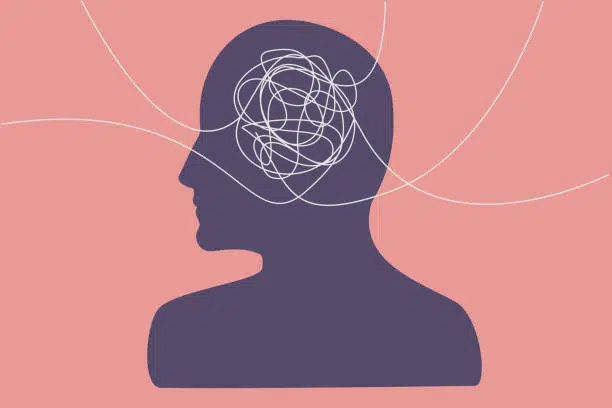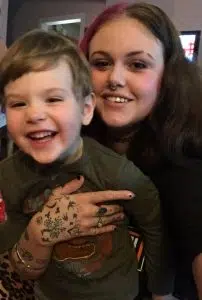
A cultural shift in normalizing men to connect with their mental health while creating spaces to do so are essential steps in helping end the stigma for men to feel valid beyond orthodox masculinity notions. / CREDIT: iStockPhoto
While pushing the notion of orthodox masculinity, many have been affected by what it means to be ‘a man’.
Men who internalize and try to align themselves with the narrow orthodox notion of masculinity create additional barriers for Queer, Black, Indigenous and more in feeling invalidated to ask for help.
Akil Mckenzie shares the feeling of being invalidated to open the conversation of being vulnerable and acknowledging access to mental health as a Black man.
“How is it okay for us to cry, when at the same time, we need to be standing in a march for people that are dying? Whether it’s our Black brothers and sisters, or Indigenous lives that are being lost and not searched for, there’s all of these different things that we stand strong for. So when it comes to something like ‘Hey, you feel a little sad today, you should do something to make yourself happy’ we don’t have time to do that,” Mckenzie notes personal mental health issues in comparison to the the bigger issue of the BIPOC community, feel small.
“But then that leads us kind of like falling through the cracks while shooting for that bigger picture. If I’m to bring it up to my parents, or if we’re talking in a group of other Black friends, and there’s this thing, now of course, this was growing up- it’s getting better now, but we’re like ‘Hey, there’s this thing that’s kind of upsetting me a little’, and if you want to cry about it, nah man. That’s white people ****,” However, suicide rates are higher for BIPOC and low income neighbourhoods. “We would think that was a white people thing to kill yourself. Meanwhile, you’ll actually see that there’s quite a few Black people that are killing themselves. So while growing up, I’ve known quite a few that have killed themselves. I was wondering where’s the disconnect? Because it felt so foreign.”

“The more I’ve let go of what it means to be a man, and just what it instead implemented, what it means to be a good person, I don’t even care if I get boys, or if I get girls, or anything in between. If I have a child, I just want to raise a good person.” / CREDIT: Akil Mckenzie
Men who face multi-layer obstacles with intersectional racial, social, and cultural aspects intertwined with masculinity meet more factors against accessing help for mental health.
“It’s difficult making the transition into the new world of how we’re expected to be able to just take on this new idea of changing your emotions as a BIPOC man, because we’ve grown up and been given expectations our entire life. Now within the span of two years, ‘Why aren’t you different?’ and that’s a hard change to make. That’s all we’ve known. We’re actually being asked for so much where ‘Hey, it’s okay to be whatever now’ and it’s never been okay, now it’s okay? You just expect us to just transition smoothly? I’ve had 24 years prior of not being allowed to do this, and one year of it being okay to cry.” In the wake of the pandemic, mental health has been in a new light, with many opening up for the first time.
“Especially when you’ve had things bottled up for so long, and then there’s also so much going on. That is hard to take time to just build yourself. There’s things going on with work and it’s already harder to get a job as a Black man. Then you look out your window and people are dying around you and then you’re supposed to find time to focus on yourself and grow as a person.”
While Mckenzie continues to work on mental health issues in today’s society, he has also reconsidered how to help generations for the future.
“I always wanted to have sons, and the reason I wanted to have sons is because I wanted to be able to raise my sons correctly. I know how I was raised, I know how I want to do it. I want to be able to create men. and that idea in itself in a way can be toxic because I have the right intentions as I want to create good men for the world that they themselves are going to be good. But, the fact that I’m sitting down and I want to raise good men means I am going to be imprinting the idea of what it means to be a man. The more I’ve let go of what it means to be a man, and just what it instead implemented, what it means to be a good person, I don’t even care if I get boys, or if I get girls, or anything in between. If I have a child, I just want to raise a good person.”
Audio Player
In raising the next generation of men, Dani Weaver is a single mother to her 3 year old son, Jayden. While Jayden is growing up to be a happy and healthy young boy, Dani is mindful of her mental illnesses including schizophrenia and borderline personality disorder that are known to be hereditary.
“I think he might actually be a little nicer and more empathetic because of my borderline personality disorder as I have such high emotions that he’ll understand how to deal with them better if other people that he meets has it. He’s a really sensitive kid. He’s already really good with emotions, and I just want to make sure he keeps his soft side”
Dani has spent a great amount of time teaching her son the importance of empathy, and validating all emotions in an effort against toxic masculinity.
“He’s very sweet and empathetic. Even if I’m crying because I’m happy he’ll put his hand on my face and say ‘What’s wrong, Mommy?’,” While Weaver raises her son, she makes an effort to have her boyfriend to be a positive male role model. “My boyfriend, every time he cries in front of me, he’ll profusely apologize and I say you don’t need to apologize. I want my son to be like that, and it breaks my heart because men think that if they cry, or if they show emotion, they’re not a man, and that’s not the case.”
A cultural shift in normalizing men to connect with their mental health while creating spaces to do so are essential steps in helping end the stigma for men to feel valid beyond orthodox masculinity notions. Notably, therapy is an incredible place to start with that transition. Daqing Wong is a psychotherapist at the Daya Counselling Centre and discusses the impact professional help has for men coming forward.
“Past generations are going ‘Don’t speak about your feelings’ or past generations are going ‘You need to talk to someone, because I wish I did when I was growing up’. So I think those past generations really depend on what they went through and where they are coming from,” Wong shares the impact of past generations raising their voice on mental health has a strong influence on the current generation. “Our current generation is looking for role models. If they’ve been told by their family, friends, and everyone in their circle that they shouldn’t talk to someone, that’s going to create a lot of shame and guilt to even consider it.”
Audio PlayerWhen it comes to taking steps toward the erasure of stigmatizing men’s mental health, the problem of orthodox masculinity is not just a male problem. Collectively, everyone in a societal stance has implicated some of the stigma or conditions of orthodox masculinity.
“I think it doesn’t have to do with just men, I think it’s within this generation. In general, where there’s an ever driving force of ‘I need to be able to be self sufficient, I need to be able to be independent, I need to be able to do it myself’, that kind of mentality is what’s kind of really messing with people. So it’s kind of that break, that’s kind of problematic.”
With orthodox masculinity and mental health binding in a multi-layer problem, everyone has implicated in some way in propagating certain ideas or notions or concepts about masculinity, and that feeds into the way that men engage with their own mental health issues.
It’s not just a problem for or among men, but it’s a problem for everyone that feels with men.



Comments